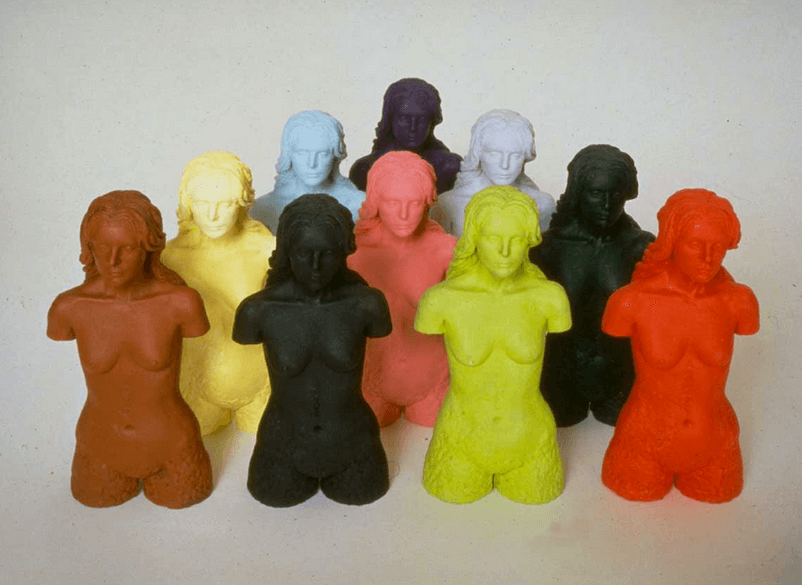The Rape Spectrum: On Jackie, Rolling Stone, and What Makes a Rape Seem Real


Hannah Wilke, “Venus Pareve”
In the last few weeks, stories detailing threats and acts of sexual violence against women have proliferated. Whether it was the ongoing coverage of the more than a dozen women who detailed being drugged and raped by comedian and cultural icon Bill Cosby, or that of the women who were targeted with rape and death threats during Gamergate, or that of Emma Sulkowicz the Columbia University student who has been walking around campus carrying a mattress “as a visual reminder that the student she says raped her—two other Columbia women have filed sexual assault claims against him, too—is still free to attend the school,” it’s as if media coverage of sexual violence was at last attempting to keep up with the actual number of incidents of sexual violence. It felt a little bit like all of the journalists and activists who had long written and spoken about the frequency with which sexual violence occurs in this country (let alone this world) hadn’t just been shouting into an echo chamber. It felt like it was maybe the time when women would start being heard.
Then three weeks ago, Rolling Stone published the story of Jackie. a student at the University of Virginia, who told RS reporter Sabrina Rubin Erdely about being horrifically, brutally gang raped by over half a dozen members of a campus fraternity, seemingly as part of some sort of initiation rite. The release of the story caused an almost instantaneous furor, with many people pointing to Jackie as if to say: “See! This is what we’ve told you happens all the time.” However, as quickly as supporters rallied around both Jackie and the story, others started to question the veracity of Jackie’s statements, as well as whether or not Erdely had reported and investigated the story in a thorough, responsible manner. And then, last Friday, Rolling Stone issued a statement reading, in part, “In the face of new information reported by the Washington Post and other news outlets, there now appear to be discrepancies in Jackie’s account.” The Post had indeed just released a lengthy reported piece which went into detail about those discrepancies, setting off a flurry of I told you so!s from the deepest, darkest, most misogynistic corners of the Internet (including one piece of human garbage, who decided it was his duty as a piece of human garbage to doxx Jackie) and a collective attempt by rational, intelligent people in the media to explain that the holes in the Rolling Stone story were the fault of Rolling Stone, of Erdely, of her editors, and even of the media’s voracity to report more and more salacious stories in the hopes of said stories going viral.
But in a case like this, nobody wants to hear that the fault lies with the reporting, rather they want to blame the victim, even though Jackie told the Post she’d asked Erdely to keep her out of the story, which, if true, is one of the more flagrant examples of unethical journalism you’ll ever find. But beyond being wildly irresponsible journalism, it is also shoddy advocacy for the victims of sexual assault. One of the reasons the article is getting so much blowback is because Erdely did not talk to (or perhaps even attempt to talk to) the men Jackie accused. Erdely claims that this was partly in a desire to protect Jackie, but as Margaret Talbot points out in the New Yorker, “one of the article’s strongest points was that, partly out of a desire to show sensitivity to Jackie, the campus administrators who heard about her claims chose not to investigate them.” However, in doing so, those administrators only perpetuated and even facilitated the existing culture of sexual violence. Talbot continues: “By arguably violating journalistic ethics to respect Jackie’s wishes and her fears of the accused, [Rolling Stone and Erdely] let the allegedly evil bros remain as hidden and unaccountable as they would want to be.”
Whether or not Jackie’s story is true—in total or in part—or completely fabricated (which seems doubtful for many reasons, not least of which is this testimonial letter from her former UVa suitemate), what is undeniable now is that Jackie’s voice has been silenced, and that the conversation surrounding sexual assault has come to focus on the rights of the accused, rather than the rights of the accuser. What is undeniable now is that because Rolling Stone and Erdely failed to confront the men whom Jackie accused for reasons having to do with “sensitivity” toward the victim, the end result is that it is those men who have become, to much of the public, the actual victims. Our society, after all, likes nothing more than exonerating men (especially white men of privilege) when they have the barest of excuses, so when it comes to men who haven’t even had the chance to give an excuse? The public court of opinion is anxious to exonerate them most of all.
But there is more to this particular case than just the violations of the rules of journalism and the absolute veracity of one woman’s story; there is also the question of why so many people were eager to disprove Jackie’s story to begin with. After all, we had been in the midst of weeks of constant reporting on the many women accusing Bill Cosby of rape, as well as a resurgence of interest in the frequency of sexual assault on college campuses. And one of the things that any anti-rape activist will tell you is that rape is—above all—common. One statistic cited over and over again in the last few days amid the furor of the Rolling Stone debacle is that one out of five women will be sexually assaulted while at college. Another popularly circulated graphic makes clear how rare it is for men to be falsely accused and how frequently victims of sexual assault fail even to come forward at all. So why is it that so many people—including women—found it impossible to believe Jackie?
When I read the Rolling Stone article, days before it began to be publicly questioned with any intensity, I reacted to Jackie’s story in a way that was unfamiliar to me when it comes to stories like this: I was surprised. I was horrified and angry and dismayed, but I was also surprised. This felt strange to me, because I consider myself pretty jaded when it comes to the issue of sexual assault—I know how frequently these things happen, I know how depressingly ordinary this type of occurrence actually is. However, the fact that Jackie’s story wasn’t “ordinary,” that it wasn’t yet another by-now-familiar case of a young college student being drugged and assaulted while intoxicated didn’t make me doubt her or her story, rather it made me want to know more. I wanted to know who these men were, what their stories were, what kind of homes and culture could create people who would treat another human being the way Jackie said they treated her. I wanted to know those things, but Erdely and Rolling Stone did not deliver them. However, despite these journalistic failings, the extraordinary nature of what Jackie said happened to her was not automatically a problem for me; I’m not narcissistic enough to believe that simply because I don’t have much experience with something, means that it doesn’t exist. And yet that was the problem so many people had with Jackie’s story—hers was no “ordinary rape,” her attackers would have to be “monsters,” her story seemed “cinematic” and therefore couldn’t possibly be true. The problem so many people had with Jackie’s story is that it told of a crime that landed in an uncomfortable part of some made-up rape spectrum, where the rape described could not possibly be the fault of anyone other than the rapist, where there could be no blaming the victim. And this is a reality with which many people are still uncomfortable.
One of the reasons that it’s possible for women who say they were assaulted by Bill Cosby to come forward (possible, though certainly not easy) or for someone like Emma Sulkowicz to make such a bold statement about her own assault and the lack of recriminations her attacker suffered is because they went through experiences that are comprehensible even to people who have never experienced anything like it. This doesn’t mean that these women are automatically believed (obviously), but it does mean that their stories are at least automatically accepted as being plausible. A story like Jackie’s, though, was greeted with immediate suspicion for being so extreme—the broken glass table, the penetration with a beer bottle, the cry of “Grab its motherfucking leg”—and we dismiss as being too much for us to comprehend. These kinds of things, we think, they just don’t happen.
The reality is, though, that up until very recently, we were all expected to believe that crimes like date rape didn’t happen and that there was no way any beloved public figure (whether a famous comedian, or a priest, or a film director, or an athlete, or a musician) could ever violate the trust of the public at large, let alone that of one woman. Rape and all forms of sexual predation were viewed with skepticism; the burden of proof always rested solely on the shoulders of the victim. We are only now beginning to change that, if slowly and imperfectly, and yet it still comes as a shock when we are confronted with a potential crime that falls outside of what we think rape is really like. What we seem to have lost sight of in the case of Jackie, though, is that just because sexual assault is common, it doesn’t mean that every rape happens the same way. Throughout history, there is no victim whose silence is ennobled like that of a rape victim, no victim who is encouraged to keep her story to herself lest she ruin her own life and those of others. But rather than be therapeutic, this silence has only served to keep alive the myth that rape is at once anomalous, yet also follows a specific idea of what we have come to believe it ought to be. It is up to us, then, to conquer our distress and horror and surprise at the pain visited on so many people, and recognize that not every sexual assault can or will fit into some idea or some spectrum of what you think happens in a college dorm room, in a frat house, or anywhere else. There is, after all, nothing “regular” about rape, other than its occurrence.
Follow Kristin Iversen on twitter @kmiversen
You might also like 




















